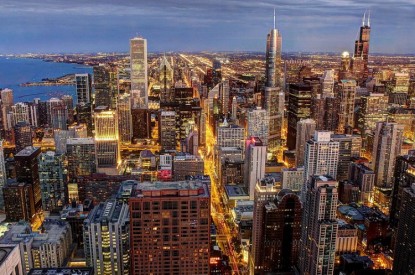Operator News
US – Illinois General Assembly misses chance to restructure Chicago’s ‘onerous’ tax
By Phil - 19 November 2019
The Illinois General Assembly has adjourned until next year without voting on whether the tax structure presented for its Chicago casino needs to be made more operator-friendly.
Chicago City Mayor Lori Lightfoot wanted the Assembly to amend the tax structure after it was described as ‘very onerous’ by gaming analyst Union Gaming who conducted a study into the financially feasibility of the Chicago casino.
Mayor Lightfoot said: “While we are disappointed that a much-needed fix to the gaming bill won’t be made during this compressed veto session, the Chicago casino is still very much in the sightline thanks to the progress we’ve made with our state partners. While this delay does not impact the City’s FY 2020 budget, this fiscal challenge looms large for FY 2021 and thereafter. Thus, the heightened sense of urgency remains. A substantial percentage of the state’s vertical capital bill depends on the revenue from a Chicago casino.
“After 30 years of only being talked about, our proposal has moved Chicago closer than ever to bringing much-needed relief for our police and fire pension funds, while unlocking significant economic opportunity for our communities and capital funding for our entire state,” she added. “From the beginning, the city’s proposal for the gaming bill has always been about finding a workable tax structure for a casino development that is projected to fuel thousands of new jobs, create hundreds of millions in new gaming revenues for the City as well as the state, all while redirecting $260m in additional funds annually that have otherwise been lost out to gambling across the border.”
To operate a casino, investor would need to pay a $250,000 application fee upfront, a $15m ‘reconciliation’ fee when the license is issued and up to $120m in gambling position fees. They would then be subject to an additional 33.3 per cent ‘privilege tax’ on top of an existing tax structure paid by all Illinois casinos.
Union Gaming stated: “The reconciliation fee alone would wipe out any profits generated for many years, if not decades under the [Adjusted Gross Receipts] tax structure. The return on investment profile for all five sites is subpar, if not negative over the five years projected herein. The reconciliation fee not only magnifies the lack of feasibility, it also shuts the door on the ability of the developer to obtain financing.”
Illinois Senator Terry Link added: “We’ve got to get a Chicago casino. If we don’t open a Chicago casino our vertical capital will be destitute, in my mind, because this is probably one of the biggest, we’re looking at a $120m upfront fee from the city immediately that would go towards capital, vertical capital, plus all the other money that’s coming from the new casinos once they get vetted by the Gaming Board. I think the payback is a huge benefit to every casino in the state.”
The other five municipalities granted new casinos in Illinois have though all submitted developers’ applications to the Illinois Gaming Board.
Haven Gaming has applied for a licence in Danville. 815 Entertainment has applied for one in Rockford. In Waukegan, CDI-RSG Waukegan, Full House Resorts and Lakeside Casino will compete to run a casino whilst the full licence could see Southland Live launch a casino in Calumet City, Wind Creek develop one in Homewood, Southland Ho-Chunk Entertainment open one in Lynwood or South Suburban Development open one in Matteson.


